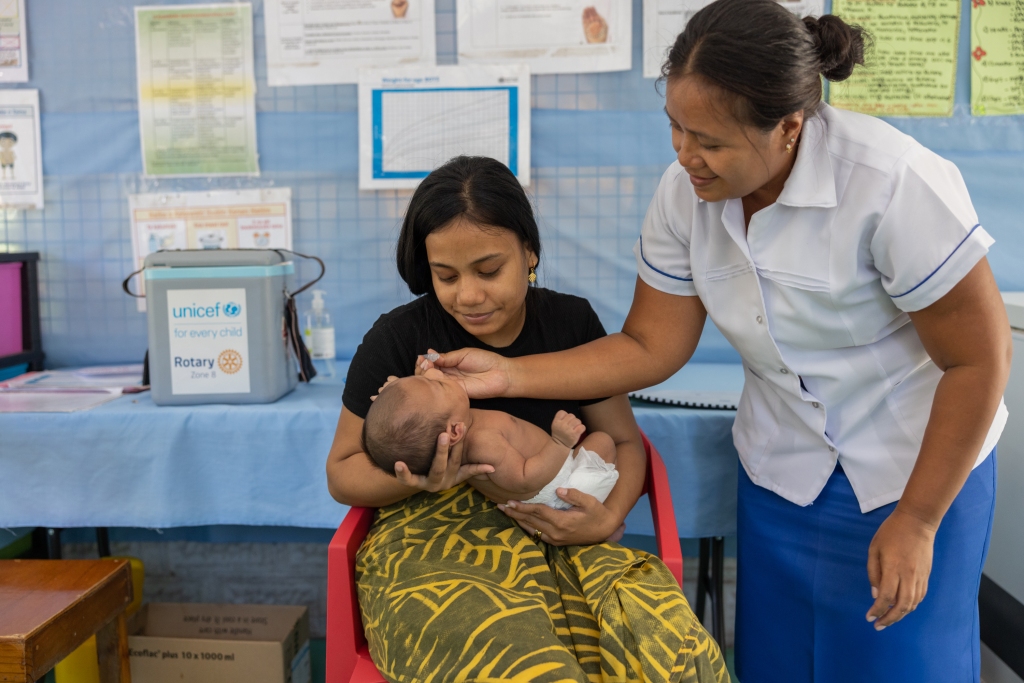By Nyreese Castro-Espadas, Area of Focus Manager for Maternal and Child Health

In July, Rotary celebrates Maternal and Child Health Month. It is an opportunity to reflect on the current status of maternal and child health around the globe, how Rotary members contribute to addressing issues at the community level, and further take the steps to analyze our collective impacts on health systems.
According to the WHO, poor women in remote areas are the least likely to receive adequate health care. This trend holds true in both developed and developing countries. Low numbers of skilled healthcare professionals in these regions are major contributing factors to limited access to care. Human resources for healthcare remain a challenge, worsening since the COVID-19 pandemic. The data suggest that 99% of births are attended by a trained midwife, doctor, or nurse in most high-income and upper-middle-income countries. This figure drops to 78% in lower-middle-income countries and even further down to 68% in low-income countries where almost 95% of all maternal deaths occur.
Many Rotary members have been developing projects that support local health authorities in increasing the capacity of existing healthcare workers, task shifting by upskilling midwives, training and equipping community health workers and integrating traditional birth attendants, where possible, and providing graduate-level scholarships to support vocations in health care.
In Panama, the Rotary Club of Boquete partnered with the Rotary Club of Skidaway Island, Savannah (United States) to implement the Manchichi midwife health monitoring program. The project aims to enhance prenatal, labor, and postpartum services by providing skills training to local midwives and cultural sensitivity training to medical professionals with a goal to improve maternal outcomes in mothers of the Ngäbe-Buglé indigenous community. This project demonstrated that basic medical knowledge combined with the familiarity of safe cultural practices led more women to adhere to prenatal care recommendations and deliver in facilities where they could be attended by skilled providers.
In Uganda, Rotary members conducted a community assessment to determine that distance between homesteads and medical facilities, and the high costs associated with the journey were the primary barriers to women accessing maternity facilities. Many women delivered before they got to facilities or arrived there tired and exhausted, unable to deliver safely. The local Rotary Club of Nkumba partnered with the Rotary Club of Allschwil-Regio Basel (Switzerland) to implement a project that provided tricycle ambulances (tuktuks) to Health Center IV’s in Uganda. The project also trained ambulance drivers and first responders to care for pregnant women during transportation.
The Theory of Change – the expected positive change that will result from the support Rotary members are offering through their projects – is that if we train enough healthcare workers, doctors, nurses, midwives, and community health workers in the principles of obstetric care, equip health facilities with needed tools, and create referral systems and quality improvement processes, we will increase access to quality health care, in turn leading to more births attended by skilled personnel and fewer deaths among mothers and their children. As clubs and districts begin to look for service opportunities during this new Rotary year, I encourage members to consider how to meaningfully contribute to a healthier future for mothers and children. Start by conducting a community assessment; speak with women, local health authorities, doctors, nurses, midwives, and community health workers in your community. Consult with a Maternal and Child Health Cadre member or the Rotary Action Group for Reproductive, Maternal and Child Health for guidance on how to start an assessment or how to design a project to address the findings from a community assessment.

Thanks for sharing this valuable content and making this topic so easy for readers to understand. Your efforts are greatly appreciated.
Thuriah Medical Center – Best Treatment of infertility in women:
https://www.thuriah.com.sa/ar/health-view?detail=5&view=الجديد-في-علاج-العقم